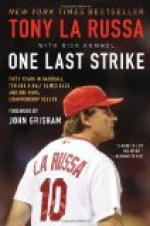“I asked for a reason, March,” he went on. “What do you say to our forming a partnership? When you get through the Law School you come to me, if you wish, and tell me that you are ready to enter my office, and I’ll answer ‘I’m very glad to have you, Mr. March.’ Of course we could arrange for a regular partnership a year or so later. Meanwhile the usual arrangement would be made. It may be that you know of some very much better office which you would prefer to go to. If you do, all right. If you don’t, come to me. What do you say?”
“But—but what good would I do you?” Joel asked, puzzled at the offer. “I’d like it very much, of course, but I can’t see—”
“I’ll tell you, March. I have a good deal of faith in your future, my boy. You have a great deal of a most valuable thing called application, which I have not, worse luck. You are also sharp-witted and level-headed to a remarkable degree. And some day, twenty or thirty years from now, you’ll likely be hard-headed, but I’ll risk that. By the time you’re out of college I shall be wanting a younger man to take hold with me. There will be plenty of them, but I shall want a good one. And that is why I make this offer. It is entirely selfish, and you need not go searching for any philanthropy in it. I’m only looking a bit ahead and buttering my toast while it’s hot, March. What do you say? Or, no, you needn’t say anything to-night. Think it over for a while, and let me know later.”
“But I don’t want to think it over,” answered Joel eagerly. “I’m ready to sign such a partnership agreement now. If you really believe that I would—could be of use to you, I’d like it mightily. And I know all about your ‘selfishness,’ and I’m very grateful to you for—for buttering your toast.”
Later, when they arose and went on, Remsen consented to accompany Joel to his room, bribed thereto with a promise of hot chocolate. They found Outfield diligently poring over a Greek history. But he immediately discarded it in favor of a new book on the Royal Game which lay in his lap hidden under a note book.
“You see,” he explained, “old Pratt has taken a shine to me, and I expected him to call this evening. And I thought at first that you were he—or him—which is it? And of course I didn’t want to disappoint the old gentleman; he has such a fine opinion of me, you know.”
While Outfield boiled the water and laid bare the contents of the larder, Joel told him of Remsen’s offer. A box of biscuits went down with a crash, and Outfield turned indignantly.
“That’s all very fine,” he exclaimed. “But where do I come in? How about Mr. West? Where does he get his show in this arrangement? You promised that if I studied law, too, Joel, you’d go into partnership with me. Now, didn’t you?”
“But it was all in fun,” protested Joel, distressedly. “I didn’t suppose you meant it, you know.”
“Meant it!” answered Outfield indignantly. “Of course I meant it. Don’t you expect I appreciate level-headedness and sharp-wittedness and applicationousness just as much as Remsen? Why, I had it all fixed. We were to have an office fitted with cherry railings and revolving bookcases near—near—”




